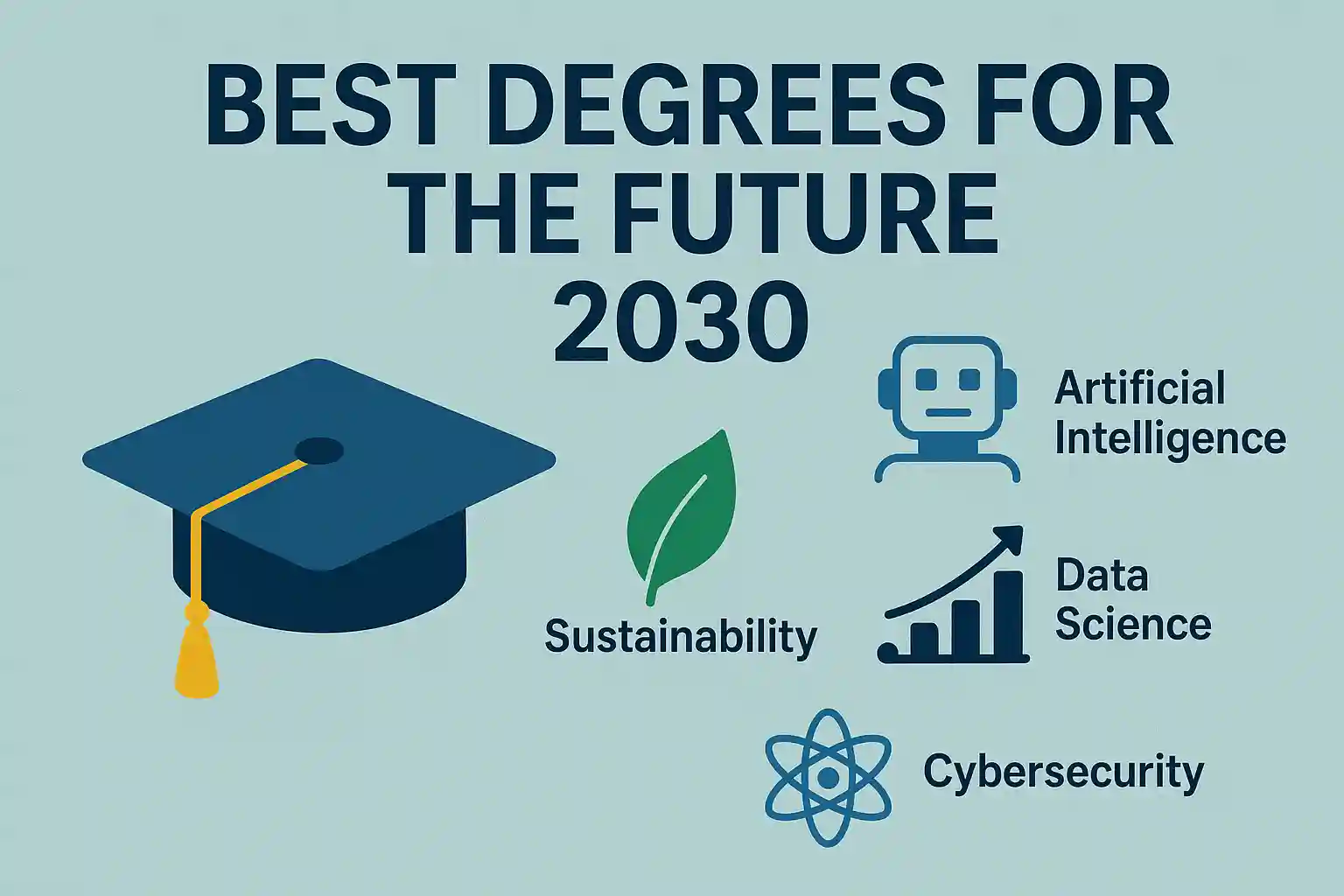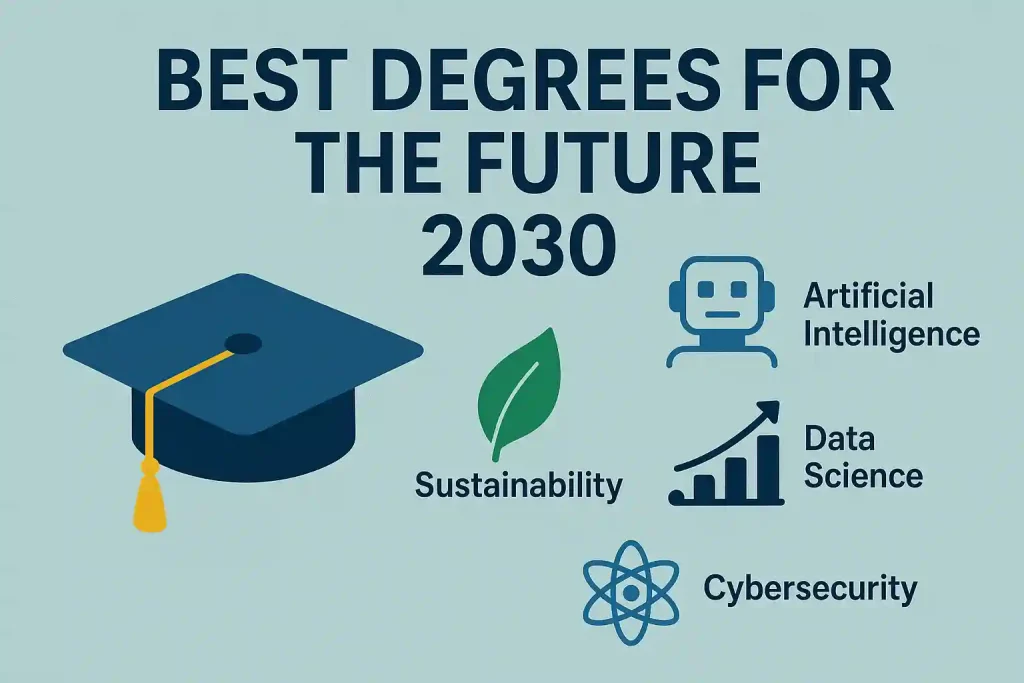Best Degrees for the Future 2030: Top Courses to Secure Your Career

Best Degrees for the Future 2030
Table of Contents
Why Choosing the Right Degree Matters in 2030
The world is evolving faster than ever. Technology, automation, artificial intelligence (AI), climate change, healthcare innovation, and global connectivity are reshaping industries at lightning speed. By 2030, many traditional jobs will vanish, while entirely new ones will emerge.
That’s why choosing the right degree today is crucial for securing your future career. Students and professionals alike need to focus on future-proof skills that ensure employability, stability, and growth.
In this article, we will explore the best degrees for the future 2030—covering technology, healthcare, sustainability, business, and creative industries. These degrees will not only open high-paying opportunities but also allow you to contribute to solving global challenges.
1. Artificial Intelligence (AI) and Machine Learning
Artificial Intelligence is no longer science fiction—it’s the backbone of the digital economy. From self-driving cars to chatbots, from fraud detection to personalized recommendations, AI is everywhere. By 2030, the global AI industry is expected to cross $1.8 trillion in value.
Why this degree is future-proof:
- AI engineers, data scientists, and ML specialists will remain in high demand.
- AI will drive automation, decision-making, and personalized customer experiences.
- Companies across healthcare, finance, manufacturing, and retail need AI solutions.
Career Opportunities:
- AI Engineer
- Machine Learning Scientist
- Robotics Developer
- Natural Language Processing (NLP) Specialist
2. Data Science and Big Data Analytics
We live in the data age. Every second, billions of data points are generated through smartphones, IoT devices, and digital transactions. Organizations need skilled professionals who can analyze and extract insights from this massive data.
Why choose Data Science:
- Data is called the “new oil.”
- Data analysts and scientists help businesses predict trends, optimize operations, and improve customer experiences.
- Big Data is applied in healthcare, e-commerce, finance, cybersecurity, and government policy-making.
Careers by 2030:
- Data Scientist
- Big Data Engineer
- Business Intelligence Analyst
- Research Scientist
3. Cybersecurity and Ethical Hacking
As technology advances, so do cyber threats. By 2030, cybercrime is expected to cost the world over $20 trillion annually. Protecting data, financial transactions, and national security will require highly skilled cybersecurity experts.
Why Cybersecurity is a top degree:
- Every company needs security experts.
- Ethical hackers are crucial for preventing attacks.
- Governments are heavily investing in digital defense.
Job Roles:
- Cybersecurity Analyst
- Penetration Tester (Ethical Hacker)
- Security Consultant
- Chief Information Security Officer (CISO)
4. Biotechnology and Genetic Engineering
Biotechnology will revolutionize healthcare, agriculture, and environmental sustainability by 2030. From personalized medicine to genetically modified crops, biotech will solve problems related to food security, climate change, and incurable diseases.
Why Biotech matters:
- Growth in pharmaceuticals, genetic therapies, and agricultural solutions.
- Huge demand for experts in DNA sequencing, CRISPR, and personalized healthcare.
- Opportunities in both public and private research.
Careers:
- Biotechnologist
- Genetic Engineer
- Bioinformatics Specialist
- Clinical Research Scientist
5. Renewable Energy and Sustainable Engineering
The future is green. As the world fights climate change, renewable energy industries like solar, wind, and hydrogen fuel will dominate. Fossil fuels are declining, making sustainability-focused degrees some of the most secure for 2030.
Why it’s important:
- The world is shifting to clean energy.
- Green engineers will be highly paid for designing sustainable infrastructure.
- Governments are investing billions in renewable energy projects.
Careers:
- Renewable Energy Engineer
- Sustainability Consultant
- Environmental Scientist
- Solar and Wind Energy Technician
6. Healthcare and Nursing
Healthcare will never go out of demand. By 2030, the global population will age rapidly, increasing the need for doctors, nurses, and healthcare administrators. Pandemics like COVID-19 proved how critical healthcare professionals are.
Why healthcare degrees are future-proof:
- High job security and demand worldwide.
- Opportunities for both local and global employment.
- Technology and telemedicine are expanding healthcare delivery.
Careers:
- Registered Nurse
- Physician Assistant
- Healthcare Administrator
- Telemedicine Specialist
7. Computer Science and Software Development
Even by 2030, software will remain the foundation of digital transformation. Every industry requires developers, system architects, and programmers. A degree in Computer Science opens doors to multiple high-paying sectors.
Why it’s valuable:
- Programming languages evolve but core computing remains essential.
- High demand in app development, blockchain, and cloud computing.
- Software professionals can work remotely worldwide.
Jobs:
- Software Developer
- Cloud Engineer
- Systems Analyst
- DevOps Engineer
8. Business Analytics and Digital Marketing
Businesses rely on smart strategies to compete globally. By 2030, business analytics and digital marketing will be more data-driven, personalized, and AI-powered. Students with this degree will lead future organizations.
Why it’s valuable:
- Companies want professionals who can make data-backed business decisions.
- Digital marketing is booming with AI tools, influencer branding, and social media.
- High flexibility—works for startups, corporations, and freelancing.
Careers:
- Business Analyst
- Digital Marketing Strategist
- SEO Specialist
- E-commerce Manager
9. Robotics and Mechatronics
Automation and robotics will replace repetitive jobs. However, skilled robotics engineers will design, maintain, and optimize these systems. By 2030, robots will dominate healthcare, logistics, and even households.
Why Robotics is booming:
- Growth in manufacturing and automation.
- Drones and robots are being used in agriculture and healthcare.
- Excellent global job opportunities.
Careers:
- Robotics Engineer
- Mechatronics Specialist
- Automation Engineer
- Drone Designer
10. Psychology and Human Behavior
Interestingly, while technology dominates, human-centered fields like psychology will thrive. Mental health awareness is increasing, and by 2030, psychologists will be essential in workplaces, schools, and healthcare.
Why Psychology matters:
- Rising stress and lifestyle-related issues.
- Demand for workplace counselors and therapists.
- Integration with AI to understand consumer behavior.
Careers:
- Clinical Psychologist
- Industrial-Organizational Psychologist
- Educational Counselor
- Behavioral Scientist
11. Global Trade, Economics, and Finance
By 2030, global markets will be even more interconnected. Economists, financial analysts, and investment bankers will remain essential. With cryptocurrencies, fintech, and digital banking booming, finance-related degrees are highly profitable.
Careers:
- Economist
- Financial Analyst
- Cryptocurrency Expert
- Investment Banker
12. Space Science and Aerospace Engineering
Space exploration is no longer limited to NASA. Companies like SpaceX, Blue Origin, and ISRO are revolutionizing space technology. By 2030, space tourism, asteroid mining, and satellite development will create new career opportunities.
Careers:
- Aerospace Engineer
- Space Scientist
- Satellite Engineer
- Astronautical Researcher
13. Education Technology (EdTech) and Online Learning
The education sector is transforming. By 2030, online learning platforms, VR classrooms, and AI tutors will dominate. Skilled educators with knowledge in technology-driven teaching will be highly valued.
Careers:
- Educational Technologist
- Online Course Designer
- Learning Experience Designer
- VR/AR Education Specialist
14. Law, Policy, and Ethics for the Digital Age
As technology evolves, legal systems must adapt. Cyber laws, data protection regulations, and AI ethics will create new legal specializations. Students with law degrees focusing on tech and global policy will be in demand.
Careers:
- Cyber Law Specialist
- Corporate Lawyer
- Policy Advisor
- AI Ethics Consultant
15. Creative Industries: Media, Film, and Design
Creativity cannot be automated. By 2030, media, content creation, and digital design will continue thriving. The rise of virtual reality, 3D animation, and immersive entertainment will keep creative degrees relevant.
Careers:
- Film Producer
- Graphic Designer
- VR Storyteller
- Content Creator

Top 10 Best Degrees for the Future in 2030
As the world evolves, technology, environment, and society are transforming the job market. By 2030, careers that blend innovation, sustainability, and human-centered solutions will dominate. Choosing the right degree today can position you for success in tomorrow’s competitive global economy. Here’s a list of the top 10 degrees that will shape the future by 2030.
1. Artificial Intelligence & Machine Learning
AI and machine learning are reshaping industries from healthcare to finance. Professionals who can design intelligent systems, automate processes, and analyze complex data will be in high demand. Graduates in this field can pursue careers as AI engineers, data scientists, or robotics specialists.
Why it’s future-proof: AI is expected to touch nearly every industry, creating sustained demand for skilled professionals.
2. Cybersecurity
As our lives become increasingly digital, cybersecurity threats are escalating. Professionals trained to protect networks, detect breaches, and safeguard digital infrastructure will be invaluable.
Career options: Cybersecurity analyst, ethical hacker, IT security consultant.
Why it’s future-proof: Cybercrime is projected to increase exponentially, making cybersecurity one of the fastest-growing job markets.
3. Data Science & Analytics
The ability to turn raw data into actionable insights is a critical skill for businesses, governments, and organizations. Data science professionals combine statistical analysis, programming, and machine learning to make informed decisions.
Career options: Data analyst, business intelligence expert, predictive analyst.
Why it’s future-proof: Organizations increasingly rely on data to optimize performance, making data science a cornerstone of modern decision-making.
4. Renewable Energy Engineering
The shift to sustainable energy sources is inevitable. Engineers focusing on solar, wind, and other renewable energy technologies will help combat climate change while powering the future.
Career options: Renewable energy engineer, solar power system designer, sustainability consultant.
Why it’s future-proof: Governments and corporations are investing heavily in green energy, ensuring long-term career growth.
5. Biotechnology & Genetic Engineering
Advances in biotech are revolutionizing medicine, agriculture, and environmental management. Professionals in this field will design new treatments, improve crops, and develop sustainable solutions.
Career options: Biotechnologist, genetic counselor, bioinformatics scientist.
Why it’s future-proof: Biotechnology is central to solving health and environmental challenges, creating a strong demand for skilled experts.
6. Robotics & Automation Engineering
Automation is transforming manufacturing, logistics, healthcare, and more. Robotics engineers design machines and automated systems that improve efficiency and safety.
Career options: Robotics engineer, automation consultant, process optimization specialist.
Why it’s future-proof: Industries are increasingly relying on automation, and robots will become essential across multiple sectors.
7. Healthcare & Medical Technology
Aging populations and technological advances will increase the need for medical professionals skilled in healthcare technology. Fields like telemedicine, medical imaging, and personalized medicine are booming.
Career options: Medical technologist, telehealth specialist, healthcare data analyst.
Why it’s future-proof: Healthcare is a human necessity, and technology integration ensures high demand for professionals.
8. Environmental Science & Climate Change Studies
Climate change is one of the most pressing global issues. Specialists in environmental science, conservation, and sustainability will guide policies and solutions to protect the planet.
Career options: Environmental consultant, climate scientist, sustainability strategist.
Why it’s future-proof: Global commitment to sustainability ensures long-term relevance and growth for this field.
9. Space Science & Aerospace Engineering
Space exploration, satellite technology, and commercial space travel are no longer science fiction. Aerospace engineers and space scientists will shape humanity’s presence in space.
Career options: Aerospace engineer, satellite systems designer, astrophysicist.
Why it’s future-proof: Increasing investment in space programs and private space enterprises will expand opportunities.
10. Digital Marketing & Experience Design
As digital platforms dominate, understanding online behavior and designing engaging experiences is crucial. Professionals who blend creativity with technology will lead the future of marketing and consumer interaction.
Career options: Digital marketing strategist, UX/UI designer, brand consultant.
Why it’s future-proof: Companies will continue to invest in digital presence and personalized experiences, ensuring strong demand.
Final Thoughts: Choosing the Best Degree for the Future 2030
The best degrees for the future 2030 combine technology, sustainability, healthcare, business, and creativity. While AI, Data Science, Cybersecurity, and Healthcare lead the way, there will always be demand for human-centered skills like psychology, law, and creativity.
Before choosing a degree, ask yourself:
- Am I passionate about this field?
- Does it solve real-world problems?
- Is it adaptable to future changes?
If the answer is yes, you’re on the right track to building a secure and rewarding career in 2030.
Read more,,,
Spanish Masters Degree Programs: A Complete Guide for International Students



